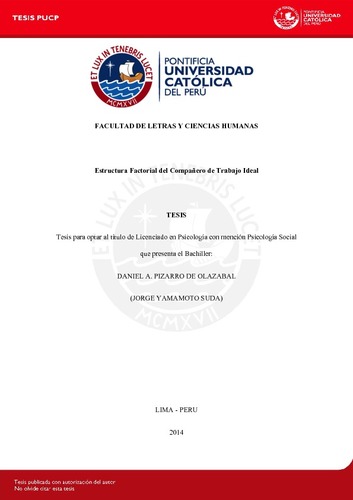| dc.contributor.advisor | Yamamoto Suda, Jorge Martín | es_ES |
| dc.contributor.author | Pizarro de Olazabal, Daniel A. | es_ES |
| dc.date.accessioned | 2015-03-26T17:28:25Z | es_ES |
| dc.date.available | 2015-03-26T17:28:25Z | es_ES |
| dc.date.created | 2014 | es_ES |
| dc.date.issued | 2015-03-26 | es_ES |
| dc.identifier.uri | http://hdl.handle.net/20.500.12404/5880 | |
| dc.description.abstract | La satisfacción laboral es uno de los componentes de importancia en la elaboración de estrategias para la gestión del capital humano debido al gran impacto que tiene en el crecimiento y desarrollo de las organizaciones. Una de las variables de mayor influencia y poco estudiadas de esta satisfacción, es la satisfacción con los compañeros de trabajo. Por este motivo, el presente estudio busca identificar la estructura factorial del compañero de trabajo ideal, es decir, el conjunto de características esperadas en el colaborador perfecto.
La muestra estuvo compuesta por 60 participantes para la fase cualitativa y 151 participantes para la fase cuantitativa, con un rango de edad entre los 22 y 36 años. El análisis factorial exploratorio encontró cuatro factores: "buenas relaciones personales", “correcto, organizado y seguro de sí mismo”, “trabaja en equipo, empático y flexible ”y “productivo y que sabe enseñar”. No se encontraron diferencias significativas que relacionaran estos factores con alguna variable demográfica de los participantes (género, edad, nivel socio-económico, universidad, tipo de colegio, años de experiencia laboral y tiempo de permanencia en la empresa actual).Estudios previos encontraron que estos factores se relacionan con diversos aspectos de la gestión del comportamiento humano, tales como: productividad, retención de líderes talentosos, compromiso, absentismo, motivación, intención de renuncia y desempeño. Estos resultados contribuyen a la mejora de la satisfacción laboral y la productividad considerando el contexto peruano. | es_ES |
| dc.description.abstract | The Job satisfaction is one of the most important components in the companies’ environment, due to its impact in the growth and development of the organization. Likewise, one of the most influential and poorly researched variable of this satisfaction is the Coworker satisfaction. Thus, the purpose of this study was to examine the factorial structure of the ideal coworker based on the related perceptions of a Peruvian workforce to further investigate the elements of coworker satisfaction within the human resources field.
Participants for this study were 60 who were interviewed during a qualitative phase, and 151 participants interviewed during a quantitative phase, between the age range of 22 to 36 years of age. After an exploratory factor analysis, results indicated the presence of four factors: “good personal relationships”, “assertive, organized and self-confident”, “team player, empathetic and flexible” and “productive and good teacher”. There were no statistical significant differences found between factors and demographic characteristics (gender, age, socio-economic status, education, years of work experience, time working in the current company). Furthermore, previous evidence suggests that these factors are related to different aspects of the human resources management, such as: productivity, retention of talented leaders, employee engagement, absenteeism, turnover intention and employee performance. These results contribute to the improvement of the work satisfaction and productivity in a Peruvian work setting. | es_ES |
| dc.language.iso | spa | es_ES |
| dc.publisher | Pontificia Universidad Católica del Perú | es_ES |
| dc.rights | Atribución-NoComercial-SinDerivadas 2.5 Perú | * |
| dc.rights | info:eu-repo/semantics/openAccess | es_ES |
| dc.rights.uri | http://creativecommons.org/licenses/by-nc-nd/2.5/pe/ | * |
| dc.subject | Satisfacción en el trabajo | es_ES |
| dc.subject | Relaciones interpersonales | es_ES |
| dc.subject | Motivación del empleado | es_ES |
| dc.subject | Administración de personal | es_ES |
| dc.title | Estructura factorial del compañero de trabajo ideal | es_ES |
| dc.type | info:eu-repo/semantics/bachelorThesis | es_ES |
| thesis.degree.name | Licenciado en Psicología Social | es_ES |
| thesis.degree.level | Título Profesional | es_ES |
| thesis.degree.grantor | Pontificia Universidad Católica del Perú. Facultad de Letras y Ciencias Humanas | es_ES |
| thesis.degree.discipline | Psicología Social | es_ES |
| renati.discipline | 313066 | es_ES |
| renati.level | https://purl.org/pe-repo/renati/level#tituloProfesional | es_ES |
| renati.type | http://purl.org/pe-repo/renati/type#tesis | es_ES |
| dc.publisher.country | PE | es_ES |
| dc.subject.ocde | http://purl.org/pe-repo/ocde/ford#5.01.00 | es_ES |






